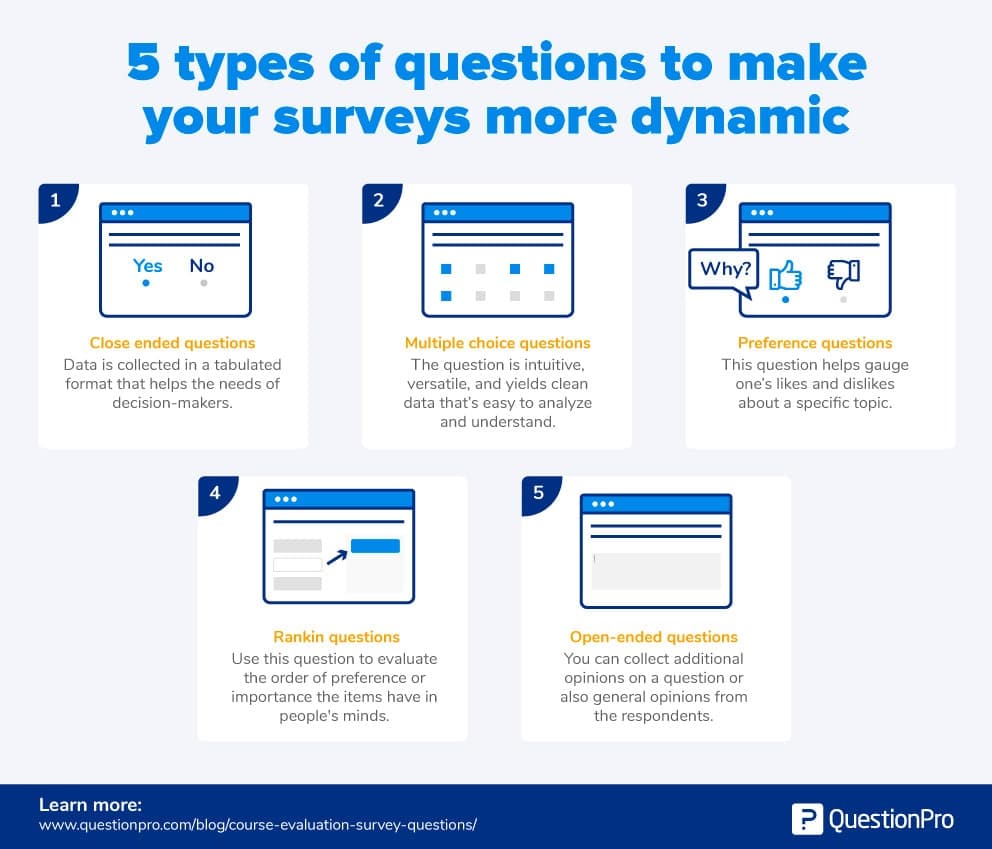

Colleges and universities run timely course evaluations to understand the problems faced by students and to gather their feedback on the courses. The feedback they receive directly from students is used to make adjustments to the course to improve it. The classroom response system allowed students to answer multiple-choice feedback questions and engage in real-time discussions instantly.
Course evaluation surveys cover various aspects of the course, like the course structure, professor feedback, course material feedback, teaching aids, etc. Based on this data, faculty members can enhance their teaching skills, and the university improves the quality of education.
While conducting a course evaluation survey, students are questioned in detail about various aspects of the course. But, here are twelve essential questions every course evaluation survey must contain.
We’ve split them into three categories:
Instructors play the most crucial role in shaping the lives of students. The quality of instruction directly impacts the quality of education level at a college or university. Whether you’re an instructor at the institution or the administrator, measure your student’s experience with some instructor specific survey questions. Learn student perspectives of what goes on in the classroom and use this feedback to make changes to the teaching approach for their benefits.
Questions like did the instructor explain the topic clearly? Was the instructor accessible and helpful outside class too? Was the grading done relatively? Understand what students think so you can improve the effectiveness of teaching, or just track the general job performance of instructors.
1. The instructor was well prepared for the class.

As a teacher, it is not only essential to present the information to students but to present it in a way that it resonates with them, and they find it necessary to learn. For this, the instructor must be prepared with the course material and must have an in-depth knowledge of the different aspects of the course. Use this question to gauge the level of preparedness of the instructor directly and use it to give instructors feedback. Instructors can also check the survey results themselves and act proactively to improve their teaching skills. A student interest survey helps customize teaching methods and curriculum to make learning more engaging and relevant to students’ lives.
2. The instructor showed an interest in helping students learn.

The quality of teaching increases when students can interact with instructors, and the instructors genuinely show interest in solving their problems. Often, if the instructor is not interactive enough, students turn to one another or online mediums to clarify doubts. This may lead to students getting misinformation. Students prefer teachers who invest time in helping them out with the course matter. This question helps to get feedback on the level of interest each instructor has toward teaching and assisting students to learn.
3. I received useful feedback on my performance on tests, papers, etc.

We all need people who give us feedback. That’s how we improve.
Feedback helps students understand the areas they lack in and in what areas they need to pull up their socks. Timely feedback helps students improve their learning experience. A learning process is always messy. Mistakes are made, and there is still room for improvement. Professors must give timely, constructive feedback so that students can understand where they stand and what steps they must take to improve. Feedback must always be goal-oriented, prioritized, actionable, student-friendly, ongoing, consistent, and timely.
The quality of the course material is just as outstanding as the instructor for the course. Course materials are crucial because they can remarkably improve a student’s achievement and understanding by supporting student learning. Ideally, the course materials are tailored towards the purpose in which they are utilized. The level and depth of the course material are directly proportional to the type of students using it. Course materials come in various forms, but the end goal of the perfect course is to support student learning. Here are the critical course material-specific questions you must include in your course evaluation survey.
4. The lectures, tests, and assignments complemented each other.

Logically, the lectures, assignments, practicals, and other small bits that make up the course must be logical and must complement each other. Student feedback is a must to understand whether the course material is in line with the lectures, the assignments, and the tests. Students lose out if there is no harmony between the factors mentioned above. Universities must gauge this and collect feedback from students directly to improve the course immediately if possible or in the future.
5. The instructional materials (i.e., books, readings, handouts, study guides, lab manuals, multimedia, software) increased my knowledge and skills in the subject matter.

Ensure that all the learning aspects like books, reading material, handouts, study guides, etc. are kept updated. This is essential for a subject like Information Technology where technology changes constantly, and students need to be up to date with the latest trends and information. In a fast-paced world, updated information keeps you in the game, and it is highly essential to provide students with updated, detailed information to boost their learning experience.
6. The course was organized in a manner that helped me understand the underlying concepts.

Some courses are tougher than others, and organizing the course in a way to benefit students best is of high importance. Courses must be structured in a way so that students get a good understanding of theoretical concepts as well as practical ideas. The course structure must cover books, readings, handouts, and practicals in such a way that the students easily grasp the idea. Run a survey to find out what it lacks and tweak the course in a manner that the students better understand it.
A successful course structure requires careful planning and needs continuous revision. Gathering course structure-specific information from students helps universities tweak existing courses to make them more efficient in imparting education and promoting student-friendly courses.
7. The course gave me the confidence to do more advanced work in the subject
 me the confidence to do more advanced work in the subject" width="662" height="385" />
me the confidence to do more advanced work in the subject" width="662" height="385" />
Understand whether the courses are impactful enough for students. A well-designed, well-structured course can impart the most knowledge in students. Students get inclined to learn more and opt for advanced courses.
8. The examinations, projects measured my knowledge of the course material

Students love to test themselves and know how they performed. Knowing their performance gives them a sense of accomplishment. Capture their thoughts on whether the examinations made them put on their thinking hats or not.
9. I believe that what I’m being asked to learn in this course is important

Students have the urge to learn more and explore more. An educational institute is the best environment for them to soak in this knowledge. Find out if they have confidence in whether the course you offer satisfies their curiosity or not.
Some topics cover a broader spectrum that often cannot be categorized under any umbrella. These are essential questions that help you instantly understand the student’s experience at the university.
10. I would highly recommend this course to other students

The answer to this question points to the direction of the success or the failure of the course. Negatives being on the higher side may be red flags, and you may have to look into how you can turn these negative responses into positive ones.
11. Overall, this course met my expectations for the quality of the course

Instantly measure the quality of the course in one single question. Universities seek to maintain specific standards, and this question helps them gauge that.
12. The course was helpful in progress toward my degree

Understand the usefulness and the effectiveness of the course and ascertain whether it was useful enough for the student in their journey of education.
It is tough to capture feedback through less engaging surveys. Also, these less appealing surveys are known to yield inaccurate results. If you want to capture authentic and accurate feedback, use these five question types to capture it accurately.
